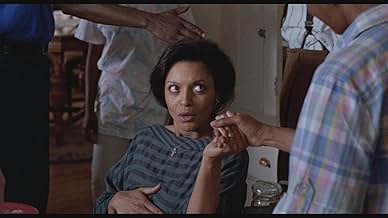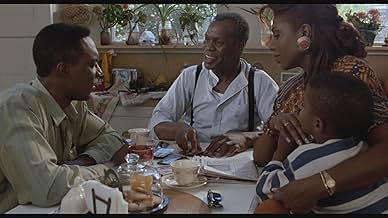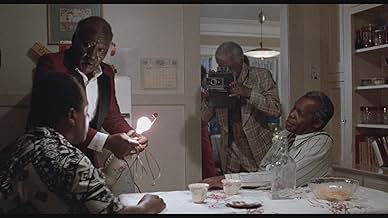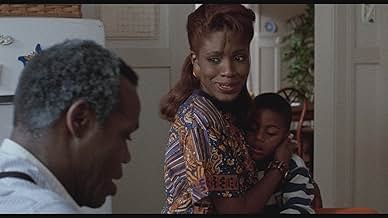To Sleep with Anger
- 1990
- Tous publics
- 1h 42m
IMDb RATING
7.1/10
3.2K
YOUR RATING
A charismatic old acquaintance drifts into town, stirring up trouble for a mild-mannered family.A charismatic old acquaintance drifts into town, stirring up trouble for a mild-mannered family.A charismatic old acquaintance drifts into town, stirring up trouble for a mild-mannered family.
- Awards
- 7 wins & 13 nominations total
DeVaughn Nixon
- Sunny
- (as Devaughn Walter Nixon)
DeForest Covan
- Fred Jenkins
- (as DeForest Coven)
- Director
- Writer
- All cast & crew
- Production, box office & more at IMDbPro
Featured reviews
"To Sleep with Anger" It is one of the richest film experiences I've had in a very long time. Since I saw it in 1993, no other American film has seemed as winning and varied as this one. It is a film I return to again and again, for the brilliant ensemble cast, the witty writing and the blend of humor, folklore and tragedy. There are no cinematic pyrotechnics. Mr. Burnett's approach to filmmaking is deceptively simple and yet his film seems far richer and more cinematic than many a more "sophisticated filmmaker". Mr. Burnett has taste and economy. He knows where to place his camera for the greatest effect and how to edit his films in a way that enhances the drama of each scene, rather than using edits to manufacture drama in a scene that is dramatically inert. He is a filmmaker of integrity and genius. This is his masterpiece.
Maybe it was the bizarre photo of a smirking, card-holding Danny Glover that always gave me the wrong impression of this film. I'm not entirely sure what I expected it to be, but I'm relatively certain I wasn't expecting a quiet family drama.
Writer/director Charles Burnett doesn't reach hard for big statements. The film appears to take place in the 1950s-60s (I couldn't be sure), but the time period isn't chosen out of a desire to create a plot focused on race relations. In fact, the drama is entirely centered around a single small family, and a wild friend from way in the past (Harry, played by Danny Glover). Cinematographer Walt Lloyd creates a familiar environment, whether or not it happens to be personally familiar to the viewer. Everything feels warm and slightly worn, including personalities and ways of speaking.
Although my personal family history couldn't be more different than the family depicted in this film, the character of Samuel "Babe Brother" (Richard Brooks) really hit home for me. His attitude on life and relationship with his father mirrors my own all too closely. It's the honestly of character depiction and interaction that brings out so much truth from Charles Burnett's writing. Everything comes together to make a perfectly realized story of absolute truth. This may just be a great film.
Writer/director Charles Burnett doesn't reach hard for big statements. The film appears to take place in the 1950s-60s (I couldn't be sure), but the time period isn't chosen out of a desire to create a plot focused on race relations. In fact, the drama is entirely centered around a single small family, and a wild friend from way in the past (Harry, played by Danny Glover). Cinematographer Walt Lloyd creates a familiar environment, whether or not it happens to be personally familiar to the viewer. Everything feels warm and slightly worn, including personalities and ways of speaking.
Although my personal family history couldn't be more different than the family depicted in this film, the character of Samuel "Babe Brother" (Richard Brooks) really hit home for me. His attitude on life and relationship with his father mirrors my own all too closely. It's the honestly of character depiction and interaction that brings out so much truth from Charles Burnett's writing. Everything comes together to make a perfectly realized story of absolute truth. This may just be a great film.
Charles Burnett is the unsung vanguard of African-American cinema, who starts his career years before Spike Lee, yet whose output is far less prolific, TO SLEEP WITH ANGER is only his third feature, after KILLER OF SHEEP (1978) and MY BROTHER'S WEDDING (1983).
The life of South Los Angeles inhabitants Gideon and Suzie (Butler and Alice) starts to unravel when an old friend from the South, Harry (Glover) blows in one day, out of hospitality and bonhomie, they invite Harry to stay as long as he wishes. After backhanded remarks questioning the philanthropic work of Gideon and Suzie's elder son Junior (Lumbly) and his wife Pat (McGee), who is gravid with a baby number two, Harry finds his perfect target in Gideon and Suzie's younger son Samuel aka. Baby Brother (Brooks), whose immaturity, trivial grievance and maladaptive fatherhood gives the access of Harry's macho, wheedling male-bonding of going back to the South, which brings tension between Baby Brother and his family, especially with his wife Linda (Ralph), who is haplessly juggling between her career and traditional drudgery assigned to a wife, child-rearing and domestic chores.
Bad omen foreshadows Harry's arrival, the opening surreal self-combusted metaphor and the breaking of Gideon's charm all presage that it is a hostage to fortune to allow Harry overstaying his welcome. In Burnett's progressive thinking, there isn't much gray zone in the tradition versus urbanization tug-of-war, Harry, an incarnation of the vileness of a hidebound mindset (characterized by male chauvinism and superstition), is a menace with an elusive ulterior motive, and Danny Glover submerses deeply into Harry's dark side with a simian, hail-fellow-well-met expansiveness that is only betrayed by his piercing, menacing glint, shrouded in a mystical aura, he is mesmeric enough to hold our attention, but we have no idea what is he up to, because gradually Harry is reduced to a symbol, an unequivocal bad influence, which makes his comeuppance a bit blunt, if there is any redeeming feature in him, it is totally under our radar.
Above all, TO SLEEP WITH ANGER is an ensemble piece, great performances are actualized, barring the top-billing Glover, also by its distaff players: Mary Alice, who is not just a devoted wife, a capable ob-gyn doctor, but also a witty and sensible mother, and knows how to live up to be the pillar of the household when the crunch befalls; Sheryl Lee Ralph, whose suffering wife of a man-child is mostly poignant, and Ethel Ayler, who plays Hattie, an old acquaintance whose newborn faith projects a searing antagonism against Harry even before he reveals his true colors. Good impression is dwindled on the man's front, Paul Butler's Gideon is taken to his bed most of the time, Carl Lumbly is prone to be an empty vessel (by making the most noise) and Richard Brooks has the juiciest role, but is squandered by a script which portrays him as the good-for-nothing every has to condone with.
That said, TO SLEEP WITH ANGER deserves to be seen by a larger demography (it is a 4-times Independent Spirit winner if that doesn't mean nothing), for its steady deconstruction-and-reconstruction of familial bonds, for its unpretentious ethnic portrayal, and most prominently, for Burnett's unorthodox, pragmatic perspective on African-Americans' assimilation and adjustment in a modern society.
The life of South Los Angeles inhabitants Gideon and Suzie (Butler and Alice) starts to unravel when an old friend from the South, Harry (Glover) blows in one day, out of hospitality and bonhomie, they invite Harry to stay as long as he wishes. After backhanded remarks questioning the philanthropic work of Gideon and Suzie's elder son Junior (Lumbly) and his wife Pat (McGee), who is gravid with a baby number two, Harry finds his perfect target in Gideon and Suzie's younger son Samuel aka. Baby Brother (Brooks), whose immaturity, trivial grievance and maladaptive fatherhood gives the access of Harry's macho, wheedling male-bonding of going back to the South, which brings tension between Baby Brother and his family, especially with his wife Linda (Ralph), who is haplessly juggling between her career and traditional drudgery assigned to a wife, child-rearing and domestic chores.
Bad omen foreshadows Harry's arrival, the opening surreal self-combusted metaphor and the breaking of Gideon's charm all presage that it is a hostage to fortune to allow Harry overstaying his welcome. In Burnett's progressive thinking, there isn't much gray zone in the tradition versus urbanization tug-of-war, Harry, an incarnation of the vileness of a hidebound mindset (characterized by male chauvinism and superstition), is a menace with an elusive ulterior motive, and Danny Glover submerses deeply into Harry's dark side with a simian, hail-fellow-well-met expansiveness that is only betrayed by his piercing, menacing glint, shrouded in a mystical aura, he is mesmeric enough to hold our attention, but we have no idea what is he up to, because gradually Harry is reduced to a symbol, an unequivocal bad influence, which makes his comeuppance a bit blunt, if there is any redeeming feature in him, it is totally under our radar.
Above all, TO SLEEP WITH ANGER is an ensemble piece, great performances are actualized, barring the top-billing Glover, also by its distaff players: Mary Alice, who is not just a devoted wife, a capable ob-gyn doctor, but also a witty and sensible mother, and knows how to live up to be the pillar of the household when the crunch befalls; Sheryl Lee Ralph, whose suffering wife of a man-child is mostly poignant, and Ethel Ayler, who plays Hattie, an old acquaintance whose newborn faith projects a searing antagonism against Harry even before he reveals his true colors. Good impression is dwindled on the man's front, Paul Butler's Gideon is taken to his bed most of the time, Carl Lumbly is prone to be an empty vessel (by making the most noise) and Richard Brooks has the juiciest role, but is squandered by a script which portrays him as the good-for-nothing every has to condone with.
That said, TO SLEEP WITH ANGER deserves to be seen by a larger demography (it is a 4-times Independent Spirit winner if that doesn't mean nothing), for its steady deconstruction-and-reconstruction of familial bonds, for its unpretentious ethnic portrayal, and most prominently, for Burnett's unorthodox, pragmatic perspective on African-Americans' assimilation and adjustment in a modern society.
. . . as I have ever seen on film. Danny Glover is an incredibly convincing devilish character - tossed into the midst of your average, striving African-American family. To see his interplay with the parents - who thought they had left their small town ways and superstitions behind - as well as with the two sons - an almost classical prodigal son story - was to witness what surely was one of the best movies of a great movie decade. This movie cemented my status as an ardent admirer of the work of Charles Burnett, surely the cream of the new crop of talented American directors. This is a very suspenseful film, one that will enlighten those with a desire to learn more about the Black experience in America.
Danny Glover shows up at the door of his old friends and moves in. Over the next few weeks, a lot of stuff happens.
Charles Burnett's movie seems to be a slice of life piece, showing the variety and contradictions of a small Black community, nominally in Los Angeles. There are tough guys and weak guys, but it's a solid working-class community where the choir sings polite gospel, and the preacher comes to visit the visit and chide them for using "old-fashioned" obeah cures instead of prayer.
This isn't the world of rap or youth, but of the older, settled community. In some ways it seems idyllic, with no drug dealers or gang violence, the standard modern cinematic image of Black communities. There's no rap music, but there is the blues and a small boy playing a trumpet very loudly.
It's warm and frequently silly, and beneath it is a had recognition of being unregarded. I found it very familiar, and if the older folks had been speaking Yiddish, i might have been, if not my own home growing up, then a cousin's, or that of one of my father's old friends.
Charles Burnett's movie seems to be a slice of life piece, showing the variety and contradictions of a small Black community, nominally in Los Angeles. There are tough guys and weak guys, but it's a solid working-class community where the choir sings polite gospel, and the preacher comes to visit the visit and chide them for using "old-fashioned" obeah cures instead of prayer.
This isn't the world of rap or youth, but of the older, settled community. In some ways it seems idyllic, with no drug dealers or gang violence, the standard modern cinematic image of Black communities. There's no rap music, but there is the blues and a small boy playing a trumpet very loudly.
It's warm and frequently silly, and beneath it is a had recognition of being unregarded. I found it very familiar, and if the older folks had been speaking Yiddish, i might have been, if not my own home growing up, then a cousin's, or that of one of my father's old friends.
Did you know
- TriviaIn 2017, the film was selected for preservation in the United States National Film Registry by the Library of Congress as being "culturally, historically, or aesthetically significant".
- Quotes
Harry: Ya, but you can't do the shuffle with one leg. You and your wife, in fortunate. Now I'm not talking about you and what you do but some folks that always run to help the victim, deep down are attracted to pain and suffering and love to be near the dying.
Junior: All the people working with us are really doing it 'cause they hate to see suffering.
Harry: You never know what's in the heart and just because you can cry doesn't make you human.
- ConnectionsReferenced in Siskel & Ebert & the Movies: Congo/The Glass Shield/Pocahontas/Fluke (1995)
- SoundtracksPrecious Memories
Traditional, attributed to J.B.F. Wright
Performed by Sister Rosetta Tharpe (as Sister Rosetta Thorpe)
Courtesy of SAVOY Records
- How long is To Sleep with Anger?Powered by Alexa
Details
Box office
- Gross US & Canada
- $1,161,135
- Opening weekend US & Canada
- $19,295
- Oct 14, 1990
- Gross worldwide
- $1,161,135
- Runtime1 hour 42 minutes
- Color
- Sound mix
- Aspect ratio
- 1.85 : 1
Contribute to this page
Suggest an edit or add missing content
































